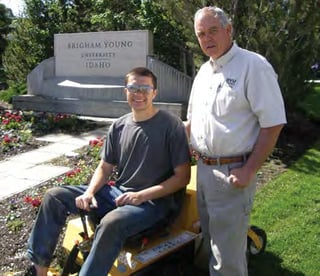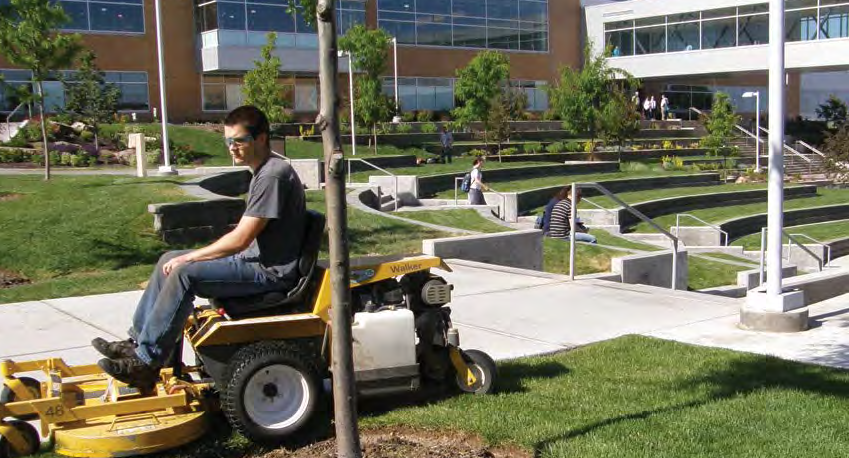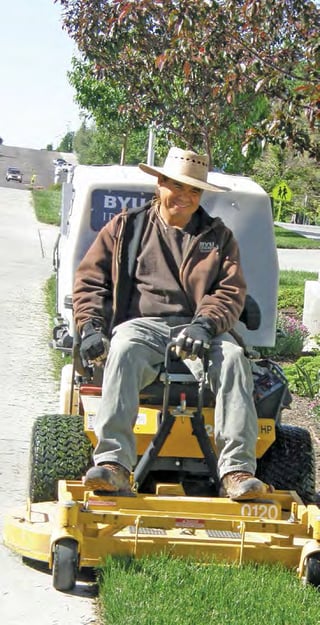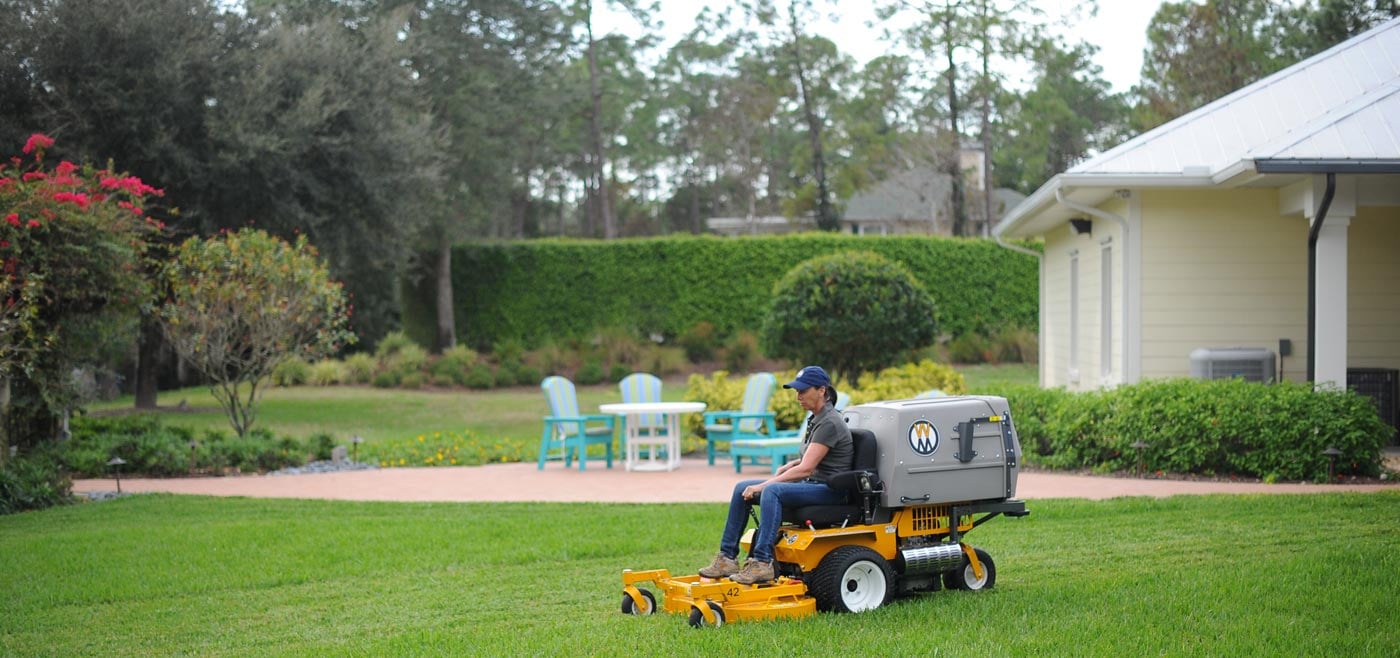Travel 80 miles southwest of West Yellowstone and you’ll drive smack into Idaho’s Snake River Valley. This area, known for its agriculture, is also home to the state’s largest private university, BYU-Idaho, located in Rexburg. The school, affiliated with The Church of Jesus Christ of Latter-day Saints, has an enrollment of approximately 15,000 students and offers more than a dozen associate degrees and nearly 80 bachelor degrees.
 Care of the beautiful 400-acre campus is the responsibility of Grounds Operation Director Jeffrey Wynn. “The school has 90 acres under irrigation, 69 of which are mowed weekly during the growing season,” says Wynn, a graduate of BYU-Idaho’s landscape management program. “We’re in high desert here, so irrigation is a requisite.” So, too, is keeping the campus in top shape.
Care of the beautiful 400-acre campus is the responsibility of Grounds Operation Director Jeffrey Wynn. “The school has 90 acres under irrigation, 69 of which are mowed weekly during the growing season,” says Wynn, a graduate of BYU-Idaho’s landscape management program. “We’re in high desert here, so irrigation is a requisite.” So, too, is keeping the campus in top shape.
“The Church is very particular about how the campus looks,” Wynn explains. “Our 15 full-time grounds staff and 60 to 80 students who work part-time with us are very conscientious. They do a tremendous job with all aspects of maintenance. We also have a full-time arborist on staff who keeps the trees pruned and looking their best.”
Wynn’s staff stepped to the plate last year when a medical issue kept him sidelined for six weeks. “I don’t think they missed me at all,” he says with a laugh. “It just shows how dedicated they are.”
Lively Campus
This spring, the full grounds department spent a couple of days installing nearly 900 flats of annual color and countless 4-inch container plants, just in time to be in full bloom for summer graduation. The school is on three 14-week semesters, each ending with a graduation ceremony.
Getting the grounds in top shape for graduation poses an ongoing challenge for Wynn and his crew, but there are others. He explains, “One of the biggest challenges we face is repairing turf that was damaged by salt. We use a lot of salt during the winter to keep students upright, and because of that the turf naturally gets damaged. Concrete walks also suffer thanks to the salt and temperatures that routinely fall below 0° F.”
Working around major construction projects poses another obstacle. Over the last 15 years, several new buildings have been constructed, including an impressive BYU-Idaho Center that seats 15,000 people and features 10 basketball courts. More recently, the central quad was renovated to accommodate an outdoor amphitheater. The school also has a new agriculture building, and additional student housing is currently under construction.
Turf Talk
Mowing and trimming keeps Wynn’s staff hopping throughout the spring and summer growing season. Approximately 80 percent of the mowing is done by 12 Walker Mowers, a fleet that includes four model B’s used primarily on hilly areas, along with eight MT’s with GHS decks. The school purchased its first Walker Mower in 2006. “What sold us on the mower was the finished cut,” says Wynn. “Again, keeping the campus looking nice is a high priority for the school and the Church.”

Not to say getting the first mower on campus was an easy sell for Walker Mower distributor and local dealer, Coates Landscape Supply. “We demonstrated the mower two, maybe three times at the school,” relates Dan Coates, sales manager. “The big obstacle for them was lever steering. The grounds staff was comfortable using mowers with steering wheels and reluctant to make the transition. It’s interesting. The students who mow probably had the easiest time adapting to the change. They had accrued less time with the steering-wheel mowers, and maybe all the texting gives them sharper hand-eye coordination.”
 Either way, the machines made their way to the campus and are now used on nearly every inch of turf—aside from small areas that still require walk-behind mowing and large expanses that call for wide-area mowers. “I don’t do any mowing,” admits Wynn. “I spend most of my day making sure people have what they need and dealing with any issues that arise.” Depending on the time of year, he also does a lot of interacting with the greenhouse staff on campus.
Either way, the machines made their way to the campus and are now used on nearly every inch of turf—aside from small areas that still require walk-behind mowing and large expanses that call for wide-area mowers. “I don’t do any mowing,” admits Wynn. “I spend most of my day making sure people have what they need and dealing with any issues that arise.” Depending on the time of year, he also does a lot of interacting with the greenhouse staff on campus.
Wynn notes the Walker Mowers are equipped with dethatching attachments for spring cleanup and make quick work of leaves in the fall. They are not used for snow, however, a task better left to tractors with brooms and trucks with plows. “We have a neat system for snow removal,” he adds. “Crews windrow the snow, which is then blown into trucks and hauled off campus.”
Thanks to the school’s Capital Needs Analysis program, Walker Mowers are on a five-year lifecycle. In fact, a couple of the newest ones had only accumulated 50-plus hours by early June. A full season of weekly mowing ahead, with crews starting at 6 a.m. and working until 3 p.m., promises to substantially add to that figure.
Wynn emphasizes that the mowers play an important role in keeping the campus looking nice, but are only part of the story. The school’s culture, working in combination with dedicated employees, is catalyst for a job well done. It’s a formula that works for BYU-Idaho and can work for any Walker Mower user.




 Site Search
Site Search



